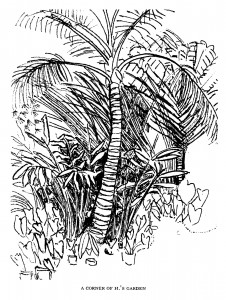Published in 1981 in Canadian Literature, P. K. Page’s Extracts from a Brazilian Journal
recounts Page’s impressions of the Brazilian countryside. The prose weaves in and out of poetic descriptions of her sensations of the water, heat, and flora, punctuated by expository accounts of the technicalities of living in the heat of South America. Presented in sections under different dates, these extracts offer a fragmented view of Page’s experience through journal entries containing Page’s signature poetic descriptions.

Illustration by P. K. Irwin (P. K. Page) accompanying Extracts from a Brazilian Journal.
© Stan Dragland. Courtesy of the copyright holder. First published in Canadian Literature 90, 1981.
Extracts from a Brazilian Journal
uniquely joins prose poetry and creative non-fiction, specifically life writing. Life writing is writing that records or recounts personal experiences, memories, and emotions. It encompasses many genres of writing, including epistolary writing, diary or journal entries, and autobiographies or memoirs. As a combination of journal entries and prose poetry, Page’s writing takes on an observational mode using the convention of life writing without, as Brian Bartlett describes it, reference to her heart or self, no preference for the gentle and the comforting
(98). Instead, in her essay Traveller, Conjuror, Journeyman
in Canadian Literature, Page describes her adoption of this observational mode as
Play, perhaps. Not as opposed to work. But spontaneous involvement which is its own reward; done for the sheer joy of doing it; for the discovery, invention, sensuous pleasure.
Taking a line for a walk, manipulating sounds, rhythms. (35)
Page equates this observational mode with painting, a stroke-by-stroke construction of an image to remember, to follow a thread back. To search for something I already know but have forgotten I know. To listen—not to but for
(36). Page’s impressionistic approach to life writing focuses on images, colours, and sound in order to play with memory.
Consider, for instance, her description of the trees in the garden around her country house:
Trees: in the garden there are varieties of what the Australians would call Rain Trees—with composite finely fretted leaves and clusters of flowers—pink, red, white or yellow. There are numerous palms—one with a pointed blade-like leaf and a massive tower of white blossoms; one like a feather duster which throws its old leaves down—feathers shed from a giant bird. We have the elephant ear tree, of which no more need be said, and one that grows smooth and straight as a young telephone pole, no branch below twelve feet. Then there is the dense and darkly massed foliage of the jackfruit tree and a spreading tree, with large, deeply indented leaves and green fruits which look like mangoes. Feathery stands of bamboo. And both nearby and, as it were, echoing off into the jungle clad hills, the Quaresmas (the name means Lent which is when they flower) blooming now with vibrant purple; and beside them, trees of pure silver, broad-leafed, and others with small clustered flowers yellow as gorse. (
Extracts from a Brazilian Journal45)
Here, Page imbues her description of the trees with what she describes in Traveller, Conjuror, Journeyman
as the sensuous pleasure
of play. The palms are not mere plants, but feather dusters
with feathers shed from a giant bird.
Her description takes on the imaginative voice of poetry, while setting out a colourful scene in small descriptive strokes, much like a painter.
Considerations for Reading Notes
- Description: Consider the aspects of the Brazilian landscape that Page describes in the most detail. For instance, how does Page describe different kinds of birds? How do these descriptions contribute to the colour, sound, and play of the prose?
- Exposition: Consider moments when Page moves from more detailed description of flora and fauna to more expository descriptions of day-to-day movements. How do these interventions, which read more like a conventional journal, structure her memories?
- Play: If these journal entries present an observational mode of play, how does Page play with the Brazilian landscape and descriptions of people? Consider the interplay between description and exposition, and her attention to nature.
Works Cited
- Bartlett, Brian.
For Sure the Kittiwake: Naming, Nature and P.K. Page.
Canadian Literature 155 (1997): 91–111. Print. (PDF) - Page, P. K.
Extracts from a Brazilian Journal.
Canadian Literature 90 (1981): 40–59. Print. (PDF) - Page, P. K.
Traveller, Conjuror, Journeyman.
Canadian Literature 46 (1970): 35–40. Print. (PDF)








 ©
©